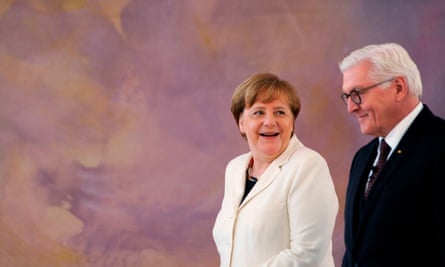Monday’s flurry of resignations from Theresa May’s cabinet is causing consternation and frustration around European capitals, with politicians and commentators expressing concerns that chaos in Westminster will paralyse Brexit negotiations and accelerate Britain’s departure from the geopolitical stage.
The prospect of further disarray would more likely cause consternation than schadenfreude in Berlin, said Josef Janning, who heads the Berlin office of the European council on foreign relations. Although that sentiment did not extend to the recently departed foreign secretary, Boris Johnson.
“The sorrow caused by Johnson’s departure in German government circles will be in short supply,” Janning said. “German politicians were alienated by the way in which he carried out his office from the beginning. He was seen as a player, an opportunist.”
Relations had got off to an awkward start during Johnson’s inaugural official visit to Berlin in November 2016, when he offered the then German foreign minister, Frank-Walter Steinmeier, an awkward fist-bump during their press conference and reportedly referred to his counterpart as “Markus-Walter” in their private meeting. Steinmeier, now Germany’s president, said he was “not amused” by Johnson’s support for Brexit.
“During Johnson’s tenure, Britain’s desire to shape the framing of European foreign policy has sunk to zero. On the key questions – how to deal with China, or the future of transatlantic relations – May has been more responsive than her foreign minister,” said Janning.

Brussels has greeted the resignations with bemusement, interest and froideur. Diplomats said neither the former Brexit secretary David Davis nor Johnson had been big figures in the Brexit talks, but raised concerns that Theresa May’s hard-fought Chequers compromise could be in doubt.
“The question is, can she pull it through,” said one EU diplomat. “The stability of the government is called in question and now we will see what happens. But even if the government were to fall … we have no other option to deal with this or the next government.
“I didn’t think Davis [going] was a big deal, I didn’t think Johnson himself was a big deal,” the source said. “But this was a moment [of confrontation] that was inevitable.
“If the government can maintain support for its policy that will only speed up the negotiation process.”
In France, Le Monde wrote: “No one will really regret the departure of the exuberant and blundering Boris Johnson.” But it added: “The deepening of the interminable political crisis in London” was taking place with only nine months until the Brexit deadline date of the end of March 2019. At this point an agreement between the 27EU member states and the UK “still seems as nebulous as ever”, the paper said.
Le Monde conceded the British political crisis had not taken Europeans totally by surprise because “an implosion of the Conservative government one day or another” was expected with the Tories still so divided over Brexit.

As for Davis, the French daily Libération said his departure “didn’t make too many waves” because “he had not, for months, been seen as the principle interlocutor of European negotiators”. The paper added: “His minimal presence in Brussels [four times since the start of the year], his lack of knowledge of the details of the negotiations, even a persistent impression of dilettantism, had left people weary.”
In Germany, Frankfurter Allgemeine was concerned that Europe was witnessing only the beginning of Britain’s descent into political chaos. “After an eventful Monday it looks more likely that the rebellion in the Conservative party will build momentum and a vote of confidence in their leader could become inevitable,” wrote the paper’s political correspondent Jochen Buchsteiner.
The news weekly Der Spiegel was reminded of a recent row between Angela Merkel and her interior minister, Horst Seehofer, who threatened to resign over the chancellor’s asylum policy.

“It’s certainly remarkable how short-sightedly and irrationally both act,” the magazine wrote. “How little it has to do with solutions, how much to do with causing chaos and of course toppling the woman in power at any price.”
In Italy, Sergio Romano wrote in the Corrier della Sera: The British crisis is a crisis of its ruling class. But now the EU must not stoop to compromises. When the UK joined the European economic area in 1973, it wanted to extract every possible economic advantage but had no intention of subscribing to the ideals of its founders.”
In La Stampa, Francesco Guerrera wrote: “Brexit has pushed Great Britain to the centre of an ’Italian-style’ storm. A prime minister who falters, in the sights of her own party rather than the opposition, with a government on the ropes and an international credibility in tatters.”
Spain may be more consumed by the thaw in relations between Madrid and the Catalan regional government, but events in Westminster have not gone unnoticed.
Mensajes que me llegan: 😂😂😂
— Amparo Polo (@Amparopolo) July 10, 2018
BRITAIN is now officially a banana republic with constant sunshine, collapsing government, depreciation currency and a good football team.
In a piece headlined, “A Brexit leader more by ambition than conviction”, El País’s UK correspondent reflected on Johnson’s time at the Foreign Office and how he had “unleashed or exacerbated diplomatic crises” and humiliated May.
A leader in the paper noted Johnson’s resignation, and that of Davis, has plunged May’s government into “a serious crisis whose common denominator is the prime minister’s inability to manage the most important movement in UK foreign policy in decades”.
The view was echoed by El Mundo. “As the months go by, it becomes clear just how high a price is being paid for the pig-headedness of a sector of the British political class that is hellbent on undoing a relationship that has brought Europeans prosperity and development,” said the paper. “May is creating a division between Britons that will have incalculable consequences.”
The Barcelona-based La Vanguardia was more laconic: “Great Britain has to leave the EU on 29 March 2019 and enter a transition period. Yet while May faces her most serious crisis, Brussels is still waiting for the umpteenth British proposal and both time and patience are running out.”
